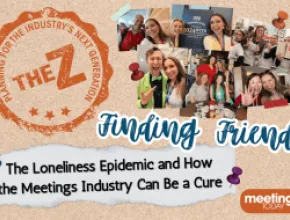There were a number of notable hotel strikes and labor actions in major meetings and conventions destinations across the U.S. in 2018, with actions against Marriott International by the UNITE HERE labor union grabbing headlines throughout the back half of 2018. Those actions have since been resolved.
Meetings Today covered the issue in a variety of articles:
- Summer Labor Disruptions Threaten Marriotts
- Workers Go on Strike at 26 Chicago Hotels
- Nearly 8,000 Workers Vote to Strike Marriott
- San Francisco, San Jose Marriott Workers Strike
- Marriott Strike: Eating Some Cost to Not Cross a Picket Line
- San Francisco Settlement Ends Marriott Strikes
Meetings Today asked hotel industry consultant Bjorn Hanson what he thought of the ongoing strike situation, and how these and other labor disruptions may continue to unfold in 2019.
Meetings Today (MT): Why was the issue of hotel strikes/labor unrest such a big news item in 2018?
Bjorn Hanson (BH): Several factors coincided in 2018:
- The highest U.S. hotel occupancy since 1981 contributed to unions, activists and some politicians believing that the industry could or should pay more.
- This is at a time when lodging executives in many hotel markets are having difficulty staffing some positions, especially room attendants, for example, so the employee and employee representatives have more leverage.
- Some who claim to represent the best interests of workers have strangely communicated that "fast food employees" and "maids" work in less respectable jobs in an effort to gain attention and support for people who work in these and similar positions.
- The political environment is leading to more activism and "victimization.”
- There has been effective management of media and coverage of many situations.
Varying combinations of the above have made the issue more relevant and more covered in 2018.
MT: How do you think this will affect the meetings and hospitality industries moving forward?
BH: There are varying perspectives among those who plan and attend meetings and events, and therefore some will see this attention, increases in minimum wage or wages in some situations, attention to the issue, etc., as positive. This is important and not always recognized by the lodging and meetings industry.
From the other perspective, costs will be higher, there will be more self-service, “open” meal periods, there will be disruptions of meetings, and the trend away from construction of hotels with convention and meeting space will increase.
MT: What tips do you have for meeting planners to guard against this, and what should they do if they’re affected by a labor action?
BH: Meeting planners can ask for legal representations that there are not pending labor issues that could affect a meeting or event, and include provisions for rescheduling (which is not always a realistic option) and repricing if there are labor issues that affect a meeting or event.
They can also ask about the timing of collective bargaining agreements and negotiations, and can select locations, hotels and affiliations that manage these issues better than others.
They can ask for contingency plans as part of a proposal or RFP.
MT: What is the current atmosphere regarding ownership vs. labor? It seems like Marriott did not take an extremely hard line regarding the UNITE HERE strikes, and ended up settling?
BH: Overall, the current situation among ownership, management and labor is really quite good.
Wages, benefits, training, opportunities for promotion, opportunities to change jobs if a situation is not good, legal protections, awareness and actions about safety, harassment, working conditions and so on are the best they have ever been.
There have been some bad choices made by owners, managers and affiliations. There have been disingenuous or unreasonable actions by unions and others representing, or claiming to represent, employees. Fortunately these are exceptions, but unfortunately some have been highly visible.
MT: What do you think the future will bring regarding this issue?
BH: I wish I could be more optimistic, but I believe the dynamics are such that there will be more aggressive tactics and confrontational approaches, some are situations when it may be justified and some when it is maybe not. Meeting, convention and event planners have adapted to so many changes over the past 40 years; they will do so with these issues and make this another core competency.
Bjorn Hanson, Ph.D., is an industry researcher and consultant. He founded and led the PricewaterhouseCoopers Hospitality and Leisure practice, served as divisional dean of the New York University Tisch Center for Hospitality, Tourism, Sports Management, is a director with Summit Hotel Properties, a New York Stock Exchange listed REIT, and serves as the company’s chair of nominations and corporate governance and has chaired the audit committee.
Hanson's professional designations include: CFE (Certified Fraud Examiner) and CRE (Certified Real Estate Counselor).






